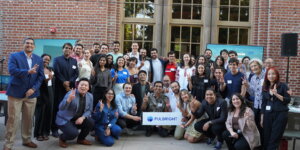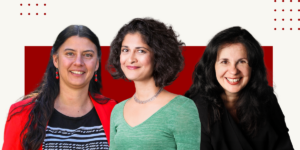
Zane Durante, recently named a 2019 Goldwater Scholar, is developing natural language processing tools to identify truthful language in child forensic interviews. Photo/Kayly Luong.
Can you tell if a child is telling the truth by their words and gestures alone? Studies in natural language processing could provide an insight. But while many parents would like to know if Timmy really brushed his teeth, new research from USC could have much more serious applications.
At the USC Viterbi Signal Analysis and Interpretation Laboratory (SAIL), undergraduate computer science student Zane Durante is developing natural language processing techniques to identify truthful or deceptive language in child forensic interviews.
The aim is to predict the probability that a child is telling the truth, ensuring the evidence gathered during child forensic interviews has the best chance of being admissible in court. During a forensic interview, a child is interviewed by the prosecutor to extract information relevant to the case.
“Currently, a lot of children’s trial testimonies are dismissed, because they’re deemed as unreliable,” said Durante, a rising junior conducting his research under the guidance of Professor Shrikanth Narayanan, Niki and Max Nikias Chair in Engineering and director of SAIL, and Phd student Victor Ardulov.
“If the child is the only witness to the abuse, it’s a really dire situation.”
The research, which Durante is working towards publishing, has already been noticed. Durante recently received a Goldwater Scholarship for 2019-2020, widely considered one of the top research awards for undergraduate students, and an Astronaut Scholarship Foundation award.
“Currently, a lot of children’s trial testimonies are dismissed, because they’re deemed as unreliable.” Zane Durante.
In addition, he won the interdisciplinary prize at the USC Undergraduate Research Symposium and received a USC Provost Undergraduate Research Fellowship to develop his research project during the spring semester.
The only witness
In any trial, the victim’s side of the story is crucial. But children’s testimony is a controversial topic: children are considered more vulnerable to suggestion than adults and often lack the communication skills to articulate traumatic events accurately.
“For instance, many children are coached by adults to lie to another adult,” said Durante.
While there is generally no way to be absolutely certain whether any witness is telling the “truth,” natural language processing could help to make a prediction.
Working with Thomas Lyon and his team from the USC Gould School of Law, Durante and the SAIL team are analyzing written transcript data of child interviews to look for “tells,” which could indicate truthful or deceptive speech.
For instance, by looking at word choice, word frequency and other gestures, such as nodding, the team hope to paint a clearer picture of whether or not a child is being truthful.
Next year, Durante will work on incorporating audio and video data in addition to the text transcripts to improve the system’s accuracy. The goal is to create a quantitative assessment, so that more child testimony can be used at trial—particularly when a child is the only witness.
Making an impact
Originally from Columbia, Missouri, Durante worked in his parents’ medical lab during high school, looking at how HIV medicine could increase the risk of certain cardiovascular diseases. At 16 years old, his work was published in the journal Free Radical Biology and Medicine.
While he initially wanted to become a doctor, at USC, he realized he could combine his love of math and coding with his passion for making a difference in people’s lives. He joined the Center for AI in Society, Student Branch (CAIS++) in freshman year, where he used machine learning to detect skin cancer from medical images. He is now collaborating with linguists to develop machine learning algorithms to document and preserve endangered languages.
“You can see the impact you’re having in the world, which is the same reason why medical research is cool.” Zane Durante.
“You can see the impact you’re having in the world, which is the same reason why medical research is cool,” said Durante.
“Seeing the applications is what research is all about: making the world a better place.”
Durante plans to continue his research with SAIL for the duration of his undergraduate career. Eventually, he hopes to pursue a PhD in artificial intelligence or machine learning, focusing on natural language processing or computer vision to solve problems facing human health and well-being.
This summer, he is completing an internship at Google, specifically developing artificial intelligence tools for Google Cloud.
“I really enjoy being around a lot of like smart and driven people. And that’s definitely what I got at USC,” said Durante. “If I’d stayed at home in Columbia, Missouri, I don’t think I would have been around this atmosphere. So, it was a big leap coming to USC, but I’m really glad I took it.”
Published on June 17th, 2019
Last updated on May 16th, 2024












